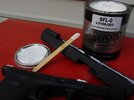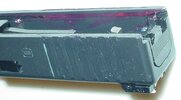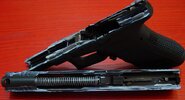I’ve got a 16 year old POS riding lawn mower like that. It’s only runs when it’s 2 quarts over full of oil!I tried lubing the Glock 44 I have the way Glock said to and had issues with some cheaper ammo. Started lubing it like I do with a 1911 and it hasn’t had any issues with any ammo I shoot now.
You are using an out of date browser. It may not display this or other websites correctly.
You should upgrade or use an alternative browser.
You should upgrade or use an alternative browser.
Glock Oiling, How Dry
- Thread starter Hartkopf
- Start date
P5 Guy
Member
What slides gets a little dab of grease. what rotates gets a little drop of oil.
No over lubing Glocks.
No over lubing Glocks.
halfmoonclip
Member
- Joined
- Feb 4, 2011
- Messages
- 2,764
My practice has been to have a sealed oil bottle on the bench while cleaning a Glock. About 12" is perfect; any closer, the Glock gets too much lube.... 
Seriously, a needle oiler is the answer.
On a Glock (or even a SIG) striker, never oil, check it for free motion (no grittiness). No need to take it down unless if feels gritty when moved. I do put a tiny drop next to the firing pin safety on both brands. Some compressed air through the firing pin opening is good for clearing any dirt.
Moon
Seriously, a needle oiler is the answer.
On a Glock (or even a SIG) striker, never oil, check it for free motion (no grittiness). No need to take it down unless if feels gritty when moved. I do put a tiny drop next to the firing pin safety on both brands. Some compressed air through the firing pin opening is good for clearing any dirt.
Moon
Riomouse911
Member
Slide channels and frame rails get a drop or two each, barrel gets drops rubbed 360 degrees around it, a drop on the recoil guide rod-spring(s) (depends on the model/generation) and a touch on the sear area.
I might be a bit heavier with oil than some. But nearly two decades of daily duty/SWAT-SRT Glock pistol carry and tens of thousands of shots fired through numerous calibers, styles & generations of Glocks, never once have I had an over or under lubrication caused issue.
Stay safe.
I might be a bit heavier with oil than some. But nearly two decades of daily duty/SWAT-SRT Glock pistol carry and tens of thousands of shots fired through numerous calibers, styles & generations of Glocks, never once have I had an over or under lubrication caused issue.

Stay safe.
shoobe01
Member
I am gonna +1 on the myth of over-lubrication. Unless it's something like a compressor or engine where the oil can get the wrong places, all it can do is make a mess. Never seen a gun shut down from over-lubrication, but tons of them from under.
Adding lube can cover many sins. You don't need to scrupulously clean if well oiled; think classes (if not combat) where there's no time to sit and get the Q-tips out, so you just add oil and drive on.
I am not a fan of grease. Regularly see grease users' guns shut down from under lubing, when dusty etc, and because it changes properties a lot more in the cold; I do enough stuff in real cold that this matters and I've had to pull out my little portable Ballistol* spray to turn a half dozen greased guns back on in the cold.
* What I use, you do you though.
Adding lube can cover many sins. You don't need to scrupulously clean if well oiled; think classes (if not combat) where there's no time to sit and get the Q-tips out, so you just add oil and drive on.
I am not a fan of grease. Regularly see grease users' guns shut down from under lubing, when dusty etc, and because it changes properties a lot more in the cold; I do enough stuff in real cold that this matters and I've had to pull out my little portable Ballistol* spray to turn a half dozen greased guns back on in the cold.
* What I use, you do you though.
sgt127
Member
- Joined
- Apr 29, 2003
- Messages
- 2,112
I was a Glock inspector at my department. I saw dripping wet Glocks. I saw dry as a bone Glocks.
I’ve never seen one fail because of too much oil. Or, too little oil.
And, I’m not a Glock fanboy. I had to give up a Colt 1911 to get an issue Glock. They fit my hand like the wrong end of a baseball bat. The trigger sucks.
But. They do one thing right. And that’s, be a gun.
I’ve never seen one fail because of too much oil. Or, too little oil.
And, I’m not a Glock fanboy. I had to give up a Colt 1911 to get an issue Glock. They fit my hand like the wrong end of a baseball bat. The trigger sucks.
But. They do one thing right. And that’s, be a gun.
generally less and from what I've noticed in most all semi-auto action pistols, if you pay attention when racking the slide, there are oil amounts that kind of in my mind work out to, feels a little dry, good, and then slippery. by feel, I don't think there is any reason to apply any more oil than makes it feel slippery or slick, that's like as smooth as it is going to get. More oil just runs, even slippery will run, but I like slippery for range use, and carry where the slide feels just a little less than totally slick, good, but that amount of oil seems to stay and not run.
What did you see fail on Glocks?I was a Glock inspector at my department. I saw dripping wet Glocks. I saw dry as a bone Glocks.
I’ve never seen one fail because of too much oil. Or, too little oil.
And, I’m not a Glock fanboy. I had to give up a Colt 1911 to get an issue Glock. They fit my hand like the wrong end of a baseball bat. The trigger sucks.
But. They do one thing right. And that’s, be a gun.
sgt127
Member
- Joined
- Apr 29, 2003
- Messages
- 2,112
What did you see fail on Glocks?
We had Glock 35’s and 23’s for 10 years, then switched to Glock 22’s.
I was responsible for annual inspections for the Officers in my unit. About 15. I honestly don’t recall any guns needing any parts replaced.
We replaced recoil springs every few years. If I knew the Officer was a shooter, I’d replace the recoil spring every year. Or, if during the inspection it seemed weak going into battery.
They just really don’t break very often.
trackskippy
Member
- Joined
- Oct 2, 2010
- Messages
- 3,493
Yea, they really dont. Even when youre using them hard.
I have a Gen 3 17 that broke a trigger spring at 90K, broke another at 120K, and broke a frame rail at 150K. Glock replaced the frame and rebuilt the gun, and Im still shooting it every week. The remaining original parts, the slide and barrel, are somewhere up over 200K now.
I also have a 26 that had over 25K on it when I quit counting, and that was years ago. So far, nothing has broken on it, and I shoot 200-300 rounds out of it every month.
I think regular, routine cleaning and maintenance of the gun, and changing the RSA's at regular intervals if you're shooting a lot, is really all most shooters really need to worry about.
I have a Gen 3 17 that broke a trigger spring at 90K, broke another at 120K, and broke a frame rail at 150K. Glock replaced the frame and rebuilt the gun, and Im still shooting it every week. The remaining original parts, the slide and barrel, are somewhere up over 200K now.
I also have a 26 that had over 25K on it when I quit counting, and that was years ago. So far, nothing has broken on it, and I shoot 200-300 rounds out of it every month.
I think regular, routine cleaning and maintenance of the gun, and changing the RSA's at regular intervals if you're shooting a lot, is really all most shooters really need to worry about.
Pat Riot
Contributing Member
I use a needle oiler with 5W20 Mobil 1 oil. I follow the Glock manual lubrication instructions. I am not shy about using the oil.
When I do a more detailed cleaning of my Glocks I will spray Hornady One Shot CLP throughout the frame and components and let it dry.
Every couple of thousand rounds I do a complete tear down inspection, clean and lube.
When I do a more detailed cleaning of my Glocks I will spray Hornady One Shot CLP throughout the frame and components and let it dry.
Every couple of thousand rounds I do a complete tear down inspection, clean and lube.
Gun-Reck
Member
- Joined
- May 16, 2023
- Messages
- 556
"...if it slides - grease it."
Even for Glocks.
Rails/tabs, connector, hood and barrel.
You can even wipe most of it off with a paper towel as all you need is a film.
Makes cleaning a snap as well, because it acts as a bond-breaker, so a paper towel gets most of the crud off.
Even for Glocks.
Rails/tabs, connector, hood and barrel.
You can even wipe most of it off with a paper towel as all you need is a film.
Makes cleaning a snap as well, because it acts as a bond-breaker, so a paper towel gets most of the crud off.
Zerodefect
member
What did you see fail on Glocks?
Trigger spring, rear plastic sight, extractor and striker eventually.
That's it. Recoil spring as needed. But most of us go waaaaay past the recommended spring life.
trackskippy
Member
- Joined
- Oct 2, 2010
- Messages
- 3,493
Yup, even a (1911) caveman can do it. 
Sorry, couldn't resist.

Sorry, couldn't resist.
Pretty sure Alanis Morissette sang it best.. "Isnt it Ironic".Yup, even a (1911) caveman can do it.
considering "striker fired" predates the 1911 and it is based off the Browning Tilting Barrel Action.
Yes I oil my Glocks in the same way as my 1911's.

Well said...again, I'll repeat....Read the owner's manual and lube as they suggest....couldn't be simpler.....RodI was a Glock inspector at my department. I saw dripping wet Glocks. I saw dry as a bone Glocks. I’ve never seen one fail because of too much oil. Or, too little oil.
And, I’m not a Glock fanboy. I had to give up a Colt 1911 to get an issue Glock. They fit my hand like the wrong end of a baseball bat. The trigger sucks. But. They do one thing right. And that’s, be a gun.
JeffG
Member
Scant use of Lubriplate on the slide rails, pretty dry other than rust protection. As it sits in the holster, nothing behind the firing pin.
sgt127
Member
- Joined
- Apr 29, 2003
- Messages
- 2,112
Sidebar.
The old Dallas PD Armorer used to get guns in (S&W model 10’s and 64’s).
Completely strip them, made sure they timed up etc. vatted them and got every drop of oil out of them.
Then hosed them down. Inside and out with silicone spray. Used compressed air to blow them out and, sent them out. With a warning. Don’t oil it. Don’t take it apart. Just use the damned thing. I’LL fix it if it needs anything.
According to him, he had more problems with guns that were full of oil. Grease. Dried oil. Oil collecting dust, lint, pollen etc than dry guns.
The old Dallas PD Armorer used to get guns in (S&W model 10’s and 64’s).
Completely strip them, made sure they timed up etc. vatted them and got every drop of oil out of them.
Then hosed them down. Inside and out with silicone spray. Used compressed air to blow them out and, sent them out. With a warning. Don’t oil it. Don’t take it apart. Just use the damned thing. I’LL fix it if it needs anything.
According to him, he had more problems with guns that were full of oil. Grease. Dried oil. Oil collecting dust, lint, pollen etc than dry guns.
Alaskamike
Member
- Joined
- Jun 19, 2020
- Messages
- 228
I'm not really clear on why Glocks should be treated differently than any other gun when it comes to lube. A little light oiling, and regular cleaning and the thing should run like a top.
I always thought the G35 would be a little too big for duty use. Did officers have any issues sitting down in patrol cars with the longer barrel?We had Glock 35’s and 23’s for 10 years, then switched to Glock 22’s.
I was responsible for annual inspections for the Officers in my unit. About 15. I honestly don’t recall any guns needing any parts replaced.
We replaced recoil springs every few years. If I knew the Officer was a shooter, I’d replace the recoil spring every year. Or, if during the inspection it seemed weak going into battery.
They just really don’t break very often.
Similar threads
- Locked
- Replies
- 20
- Views
- 2K
- Locked
- Replies
- 18
- Views
- 1K
- Replies
- 20
- Views
- 2K
- Replies
- 16
- Views
- 2K




